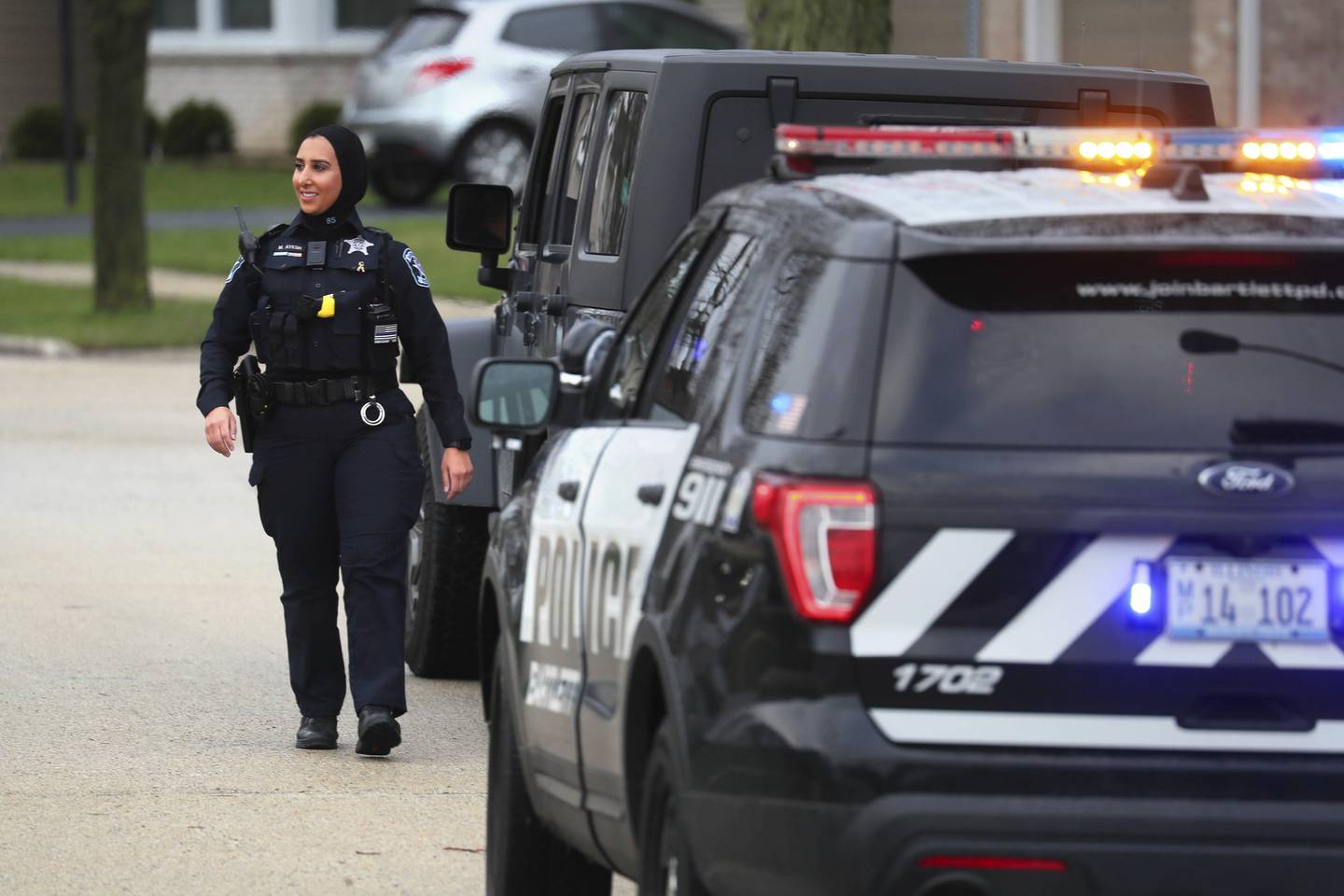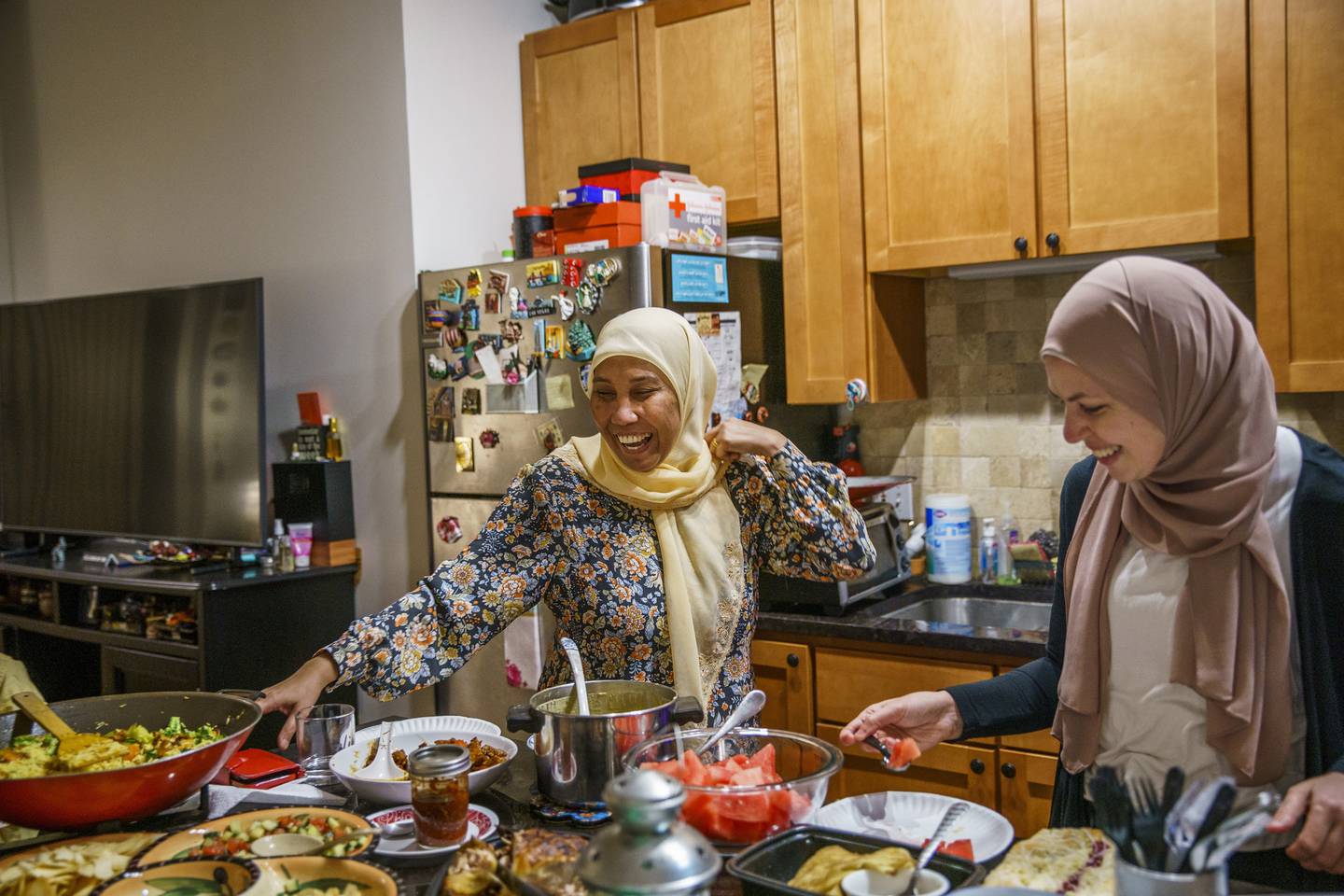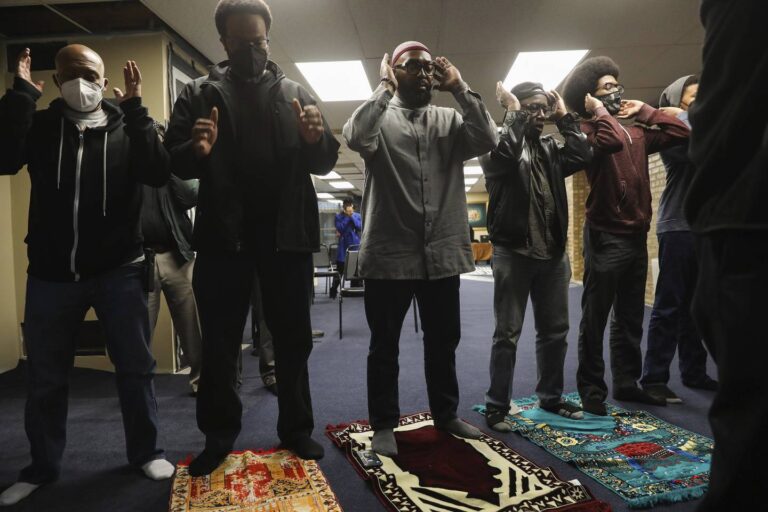There’s a shared notion between all those who celebrate, that Ramadan just hits different. Even though you’re objectively hungry or thirsty, your soul feels quenched, said Tariq El-Amin, imam at Masjid Al-Taqwa on Chicago’s Southeast Side, and host of “Black Glue Podcast,” where conversations are centered on Black and Muslim experiences in America.
For 30 days during the ninth month of the Islamic calendar, Muslims fast from slightly before dawn until dusk, which in the Chicago area adds up to about 14 hours and 58 minutes. The fast begins with a morning meal known as suhoor and is broken with an evening meal called iftar, where it is recommended practice to begin eating with a date and some water.
Advertisement
Muslims, while obligated to pray five times daily no matter the month, take it up a notch on things like reading the Quran, partaking in extra prayers and giving charity.
The Eid holiday marking the end of Ramadan will be Sunday or Monday, depending on the sighting of the new moon. And as the holy month comes to a close, El-Amin offered that there’s something to be said about how quickly the month slips away, replacing the hustle and bustle of communal prayers and 4 a.m. alarm clocks with a helpless urge to cling to the “feelings” of the month.
Advertisement
“Fasting is a human attempt at gratitude, and an attempt to gain clarity. We fast to increase our God consciousness, or what we term as taqwa. It’s a way for us to maintain a connection not just with God, but also our fellow human beings, our neighbors, our families,” El-Amin said over the phone while construction crews were tiling the floors of the mosque’s new property at 9329 S. Escanaba Ave.
Renovations at Masjid Al-Taqwa, which serves a large Muslim community on the South Side and the south suburbs, are expected to be completed by July. But even during construction the place of worship is open for Jummah, or Friday prayers, and during Ramadan on the weekends for communal prayers known as taraweeh.
For people who don’t know “why we fast,” El-Amin said it’s worth understanding the benefits of the practice outside the tenets of Islam.
“What fasting does is it actually allows us to realize how much we consume out of habit and not really out of need,” he explained. “And that awareness makes us realize there’s a lack of control, and we are being given an opportunity to reclaim our agency. It’s a really beautiful thing.”
El-Amin noted that science has caught up with religion in its observations of the medical and health benefits associated with fasting. But there’s also an ethical and behavioral component to fasting in Ramadan that stretches beyond the dietary.
“For people who engage in the practice of fasting, they do so with one of the goals of becoming a better person. We also fast from feelings of jealousy, anger, suspicion. … We’re making a conscious effort to think well about others around us,” he said.
Above all, El-Amin said, the main takeaway when the month wraps up should be empathy.
“Your hunger should make you think about the people who don’t have an iftar. We’re reminded of those who are not able to break their fast, who wake up fasting and will go to sleep fasting,” he said. “This forces us back to the realization that we are not the center of the universe.”
Advertisement
“You can’t even have water?” a colleague asked Maha Ayesh a few weeks ago as Ramadan began.
“No, not even water,” she responded, as a set of bulging eyes looked back at her saying, “Oh man, I would die.”
Being the only Muslim police officer at the Bartlett Police Department, Ayesh brought in a platter of sweets with a note that read “Ramadan Mubarak” before the Islamic month kicked off to introduce her team to what she would be going through for the next 30 days.
“They looked at me with so much curiosity, ‘Like no water, no food, nothing?’” Ayesh said. “These encounters are what I love because number one, I am the first Muslim to ever work for them, and I’m the first one that they had to alter their policies to accommodate for in terms of the hijab. Those questions are never going to upset me at all, it’s going to be something that I would love to converse about.”

For the 31-year-old Palestinian American who will mark two years as a patrol officer in October, sparking conversations has become a defining trait, and she is aware of the barrier-breaking optics of her position.
“At first I didn’t know if I could do it,” Ayesh said over the phone on her first half-day off in a week.
Advertisement
Ayesh holds a master’s degree in forensic psychology and before pursuing her inkling for law enforcement, worked at Kane County Jail evaluating inmates for mental health disorders. She is reportedly the first female Muslim patrol officer in Illinois, and she wears that badge as proudly as she wears the hijab.
“When I realize I did what was never done before to break a barrier, to break fears … to just move past all those insecurities and say, wow, I’m the first one, it’s so humbling,” Ayesh said. “When I see people, even on the street, they’re like, ‘Whoa, I’ve never seen a Muslim police officer wearing hijab. This is so amazing.’ You don’t require someone to come tell you that, but it’s such a sense of appreciation. I always say it would be easier, but it was never a thought of mine to do it and take off the hijab.”
With an already packed week ahead, Ayesh also picked up a night shift to help out a colleague. She’d break fast at her parent’s home in Lombard, have dinner and pray before heading to the station at 10 p.m.
On a typical Ramadan day, Ayesh wakes up around 4 a.m. to have suhoor and then offers Fajr — the early morning prayer — before driving off to her 6 a.m. to 6 p.m. shift.
“Alhamdulillah, I really start my days off pretty strong and motivated. Around noon I’m feeling a little tired, but I still have the ability to get through because we have different experiences that really keep the adrenaline going,” Ayesh said. “I always sip on my coffee all day, so that’s the only thing that I miss.”
While on duty, Ayesh carves out a place to pray a couple times a day to fulfill the five daily prayers. “You pray wherever you are. You get out of the car, put your car in park and pray. You can find a little place like a fitting room or even just outside. That’s how I’ve grown up,” she said.
Advertisement
Throughout her experience of fasting while on duty, Ayesh has had her squad to lean on.
“A lot of the officers come by and ask, ‘Hey, how are you holding up Maha?” I tell them I’m good. I’m just a little tired. I never feel like I am alone,” she said. “The day goes on, roll call, we all work together.”

There’s a tinge of peace this Ramadan for Ayesh that was overshadowed by a field training program last year. This month, she graduated from probation, officially making her a union officer. “Now it’s more about what I can do on the job and as part of the religion that can help me in my day to day,” she added.
A source of great relief and joy for Ayesh has been encounters like the one recently at a Jain temple in Bartlett. A few evenings ago, after Ayesh and another officer completed a security detail, a woman at the temple approached Ayesh to ask if she was fasting for Ramadan, given that it was 7:40 p.m., post-sunset.
Ayesh told the woman she had a Cliff bar in the car, but didn’t have time yet to grab food. The woman immediately said, “you’re going to come down with me, we’re going to make you a plate and you’re going to have your iftar,” Ayesh said.
“It was so, so amazing to have two different religions in the same place, and both of us were able to observe with so much respect,” Ayesh said. “She just assumed and I confirmed, and she had the hospitality to make me a plate. And I was still able to do my job.”
Advertisement
For Rohany Nayan, this Ramadan in particular was about internalizing her faith while practicing an eco-friendly lifestyle. As CEO of Chicago Muslims Green Team, a local faith-based nonprofit, she pledged to closely follow the organization’s mission of six R’s: reconnect, reflect, repair, reuse, recycle and reduce.
“We can apply all of those terms spiritually and physically,” Nayan said. “Reduce is a big one — I am trying to reduce a lot of the habits that are harmful. You have to know Allah and learn what is expected of you, and then we can know better how to channel the blessings we have to the society that we live in.”
Nayan said her goal this year is to cook less and spend that time instead reading religious books or in zikr, which is a form of meditative worship. She’s also avoiding frequent trips to the grocery store and making do with a little.
“I am eating less meat and more vegetarian dishes for iftar to help reduce my carbon footprint,” she said. “You can help the earth heal while you help yourself heal.”
She’s also making an effort to compost whatever can be salvaged, explaining that a lot of food tends to be wasted during Ramadan, partly because people make more food than they have the capacity to consume after a long day’s fast.

For someone with a scaled back approach to living, Nayan often surprises people when she tells them of her many endeavors over the years. She not only holds a Ph.D. in curriculum and instruction with a concentration in literacy studies, she has taught at the University of Illinois Chicago, the University of North Carolina at Charlotte, Massachusetts Institute of Technology and overseas at the King Saud University in Riyadh, Saudi Arabia.
Advertisement
Now living “as an empty nester” in Chicago’s West Loop with her husband, she spends most of her time creating opportunities at Chicago Muslims Green Team that enforce literacy development and cross-cultural awareness related to environmental issues. And when she’s not doing that — she’s most likely in worship.
Before beginning the fast with an early meal of plant-based foods and lots of water, Nayan wakes up at 3 a.m. for tahajjud, or what’s known in Islam as a voluntary night prayer.
“I really love the quiet moments of tahajjud, that’s when I can have a conversation with God,” Nayan said, adding that when she was younger, she didn’t know how to make dua, or pray, but has found valuable resources like Yaqeen Institute to help. “I found that I’m not shy to ask God for anything. God is my best helper.”
She also spends time reading and understanding the Quran in its original language. Being Malaysian and not a native speaker of Arabic, it’s an accomplishment Nayan has been working toward for 10 years.
The interconnectedness of green living and guidance from Islamic text is something people don’t realize until they do it, she elaborated.
On the Chicago Muslims Green Team webpage, an excerpt from the Quran scrolls by: “Eat and drink from the provision of God, And do not commit abuse on the earth nor spread corruption (Surah Al-Baqarah 2:60).”
Advertisement
Nayan referred to the Islamic month as “training to be who you want to be,” and for her it starts and ends with her relationship with faith.
“Ramadan is about becoming aware of the blessings we have, which we often take for granted. When you’re fasting, for example, you can say you’re hungry when you run into a homeless person, but until you experience what hunger means, you don’t really know what they are experiencing,” Nayan said. “It’s about being aware of who bestows these blessings upon you.”
And when the God consciousness lines up with an improved sense of self, “you become happier,” she added.







